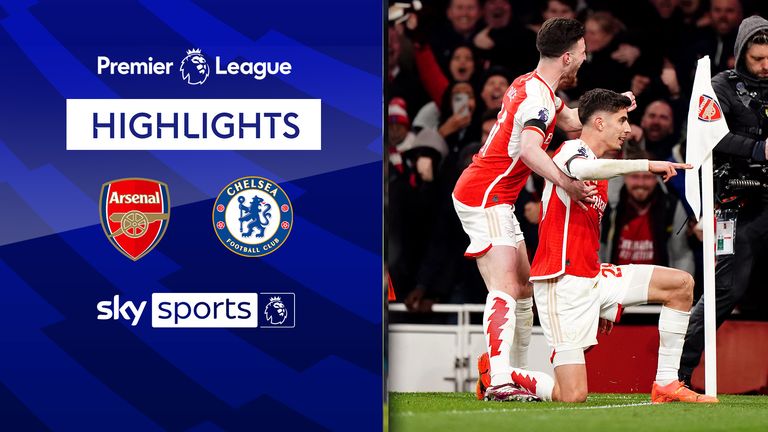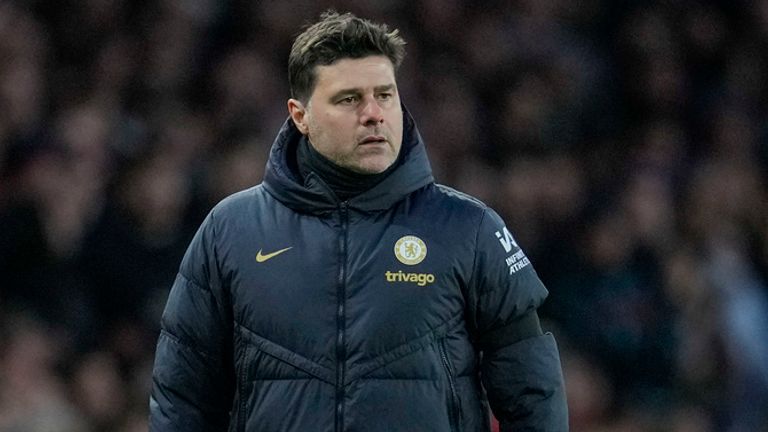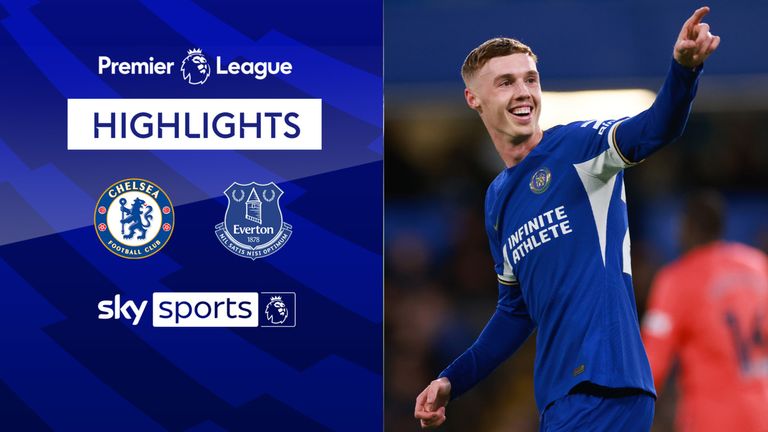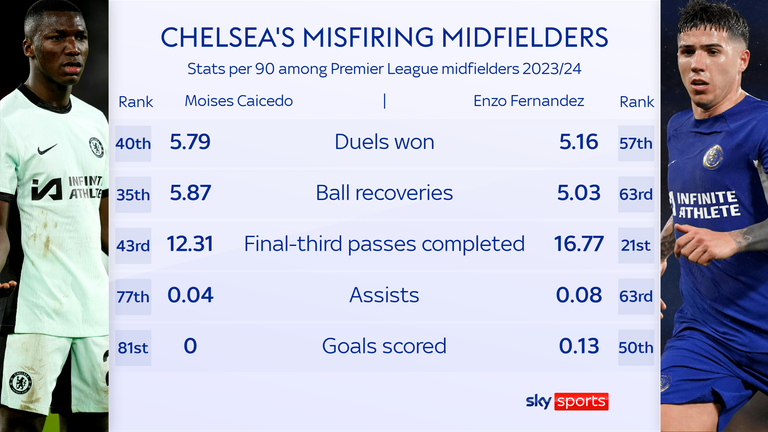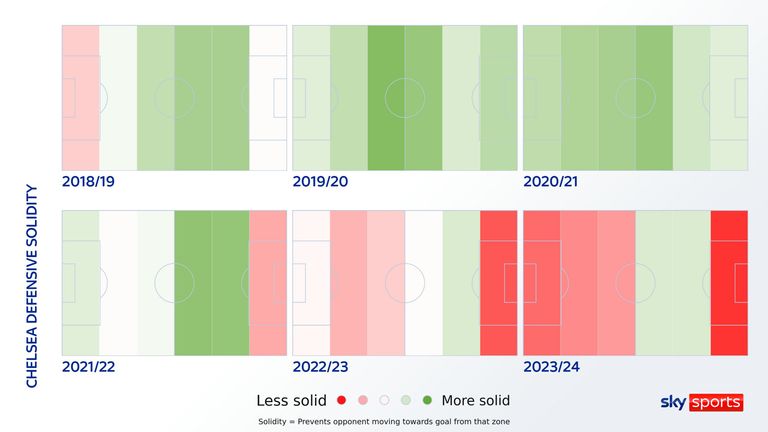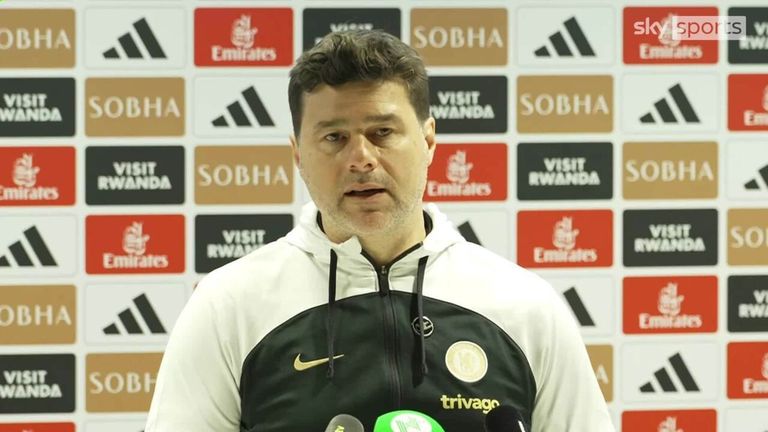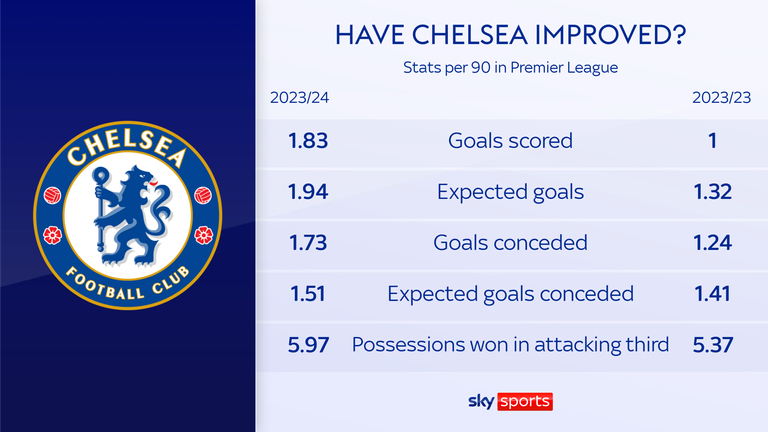Chelsea: Mauricio Pochettino must try to organise chaos into calm if Europe remains realistic target | Football News

“When we have bad days, we are so bad,” a forlorn Mauricio Pochettino said after Tuesday’s 5-0 hammering at title-chasing Arsenal. The problem was not so much the defeat, but the manner and scale of it.
This was the Blues’ heaviest defeat in a London derby since losing 6-0 to Queens Park Rangers in 1986, best summed up by a young fan in the crowd at the Emirates, holding a condemnatory sign that read: “I don’t want your shirt! I want you to fight for ours.”
The truth hurts.
Arsenal took their opportunity to add to the Chelsea pile-on with ruthless efficiency, and now the hopelessness feels at its lowest ebb under Pochettino’s rule. They have fallen short at every decisive juncture. Two trips to Wembley (Carabao Cup final and FA Cup semi) didn’t even manage to draw a response.
And yet, this enigma of a team, which changes its idiosyncrasies from game to game, can still finish among the European spots this season. Where is the sense in that?
This is a side characterised by nonsense and naivety, one that wins 6-0 and loses 5-0 all within the same eight-day period. It is one that is full of youthful vibrancy when the going’s good, and utter disarray when it’s not.
An increasingly frustrated Pochettino has given up trying to suggest Chelsea, in his guise, are particularly far along in their evolution. His original ‘trust the process’ rhetoric has been ditched in favour of a more realistic assessment, hinting that too many players are happy to cruise in the “comfort zone”.
The Argentine, nine months into the job, wears the look of a man worn down by the strains of such a burdensome project – the next step of which sees Chelsea travel to Aston Villa on Saturday – a club with a newish model at the opposite end of the spectrum, gathering pace and momentum under Unai Emery.
“Maybe this group is not mature enough to compete in games every three days,” Pochettino said after dropping points to bottom club Sheffield United in early April, a week after also losing points to 19th-placed Burnley, with a thrilling 4-3 win over Manchester United sandwiched in between.
Uncovering any reasoned logic is impossible. It’s a circus – a series of results, and incidents, that continually contrive to undermine small tokens of progress.
Chelsea have spent more than £1bn in four transfer windows since being taken over by Clearlake Capital, led by Todd Boehly. The majority of that spend has been targeted on players under 25 – the idea being they will increase in quality and therefore value as time goes on – but the numerous flaws in that so-called ‘strategy’ are exposed most weeks.
Linear development does not happen overnight.
Pochettino, the third permanent manager under said ownership, has been left with the youngest squad, by average age, in the Premier League.
“The circumstances are bigger than the performance of the players,” he said at the Emirates on Tuesday. But where is the experienced goalkeeper? Where is the commanding centre-back? Where is the proven No 9? The entire spine of a coherent team is missing.
A turning point was suggested when Chelsea reached the Carabao Cup final in February, and again when they beat Newcastle in March – and again when they overturned a stoppage-time deficit to stun Manchester United. Nothing ever came of it.
Pochettino is still waiting for his eureka moment.
At the heart, Chelsea are dynamic and fleetingly entertaining, but equally fallible and flawed. With six games of the season to salvage something from the wreckage, where do they turn next?
The £221m problem: Fernandez & Caicedo
Enzo Fernandez and Moises Caicedo are two prime examples of players drowning in the sea of inflated expectations at Chelsea.
Fernandez arrived in January 2023 for a staggering £106.8m, then a British-record fee, embellished by his new-found status as a world champion, but is yet to come close to providing value for money.
Fernandez is at his best as a No 8, given license to roam, influencing games between both boxes, but it is hard to find any category in which he excels.
The same is true for Caicedo, the £115m summer signing whose contributions have punished Chelsea more often than they have furthered their cause.
Among Premier League midfielders per 90 minutes this season, neither Fernandez nor Caicedo rank in the top 40 for goals, assists or completed take-ons, placing undue pressure on the overworked Conor Gallagher to provide attacking spark from midfield.
Those underwhelming figures could be forgiven if the pair dominated defensively. They don’t. Instead, they chart just outside the league’s top 40 for duels won, interceptions and ball recoveries.
Worst defensive record of any Chelsea team
Problems in midfield. Problems in defence. Issues are widespread.
Chelsea have conceded 57 goals in the Premier League this season; their most in a single campaign, overtaking the 55 they shipped in 1994-95 and 1996-97.
“The capacity, the energy, the hunger – that is the minimum to compete in the Premier League,” said Pochettino after being pegged back by 10-player Burnley in late March. He is right. But what about the basics? Chelsea rank 14th for average goals conceded this term – 1.8 per game.
Axel Disasi and Benoit Badiashile, the defensive duo chosen to face Arsenal, actually concede an average of 2.4 per game when partnered together, while novice Goalkeeper Djordje Petrovic, signed from the MLS, does not rank favourably among peers either.
Chelsea chart 12th for clean sheets (six). Their expected goals conceded – 50.3 – puts them 13th. Errors have led to goals, and goals have squandered points with an alarming frequency.
Long-term defensive injuries to captain Reece James and Wesley Fofana, and sporadically Ben Chilwell and Levi Colwill, offer some degree of mitigation, but do not exonerate a team mired by immaturity. There is ill-discipline too – Chelsea have collected more yellow cards (92) than any other side.
Desperate hope or cautious optimism?
And yet, despite the injuries, inconsistencies and ineffectiveness, Chelsea remain within touching distance of the European places, only three points adrift of Newcastle in sixth.
Pochettino has indeed overseen progress in certain areas, albeit with the brilliance of Cole Palmer obscuring many facets of underperformance. If you took Palmer’s goal contributions (29) out of this Chelsea team, they would be 22 points worse off – level with Luton Town.
The club can, however, take credit for seeing something in Palmer that the great Pep Guardiola did not. Beyond a rare recruitment success, Palmer’s signing is one that Pochettino has helped turn into one of the league’s standout attacking forces.
The Blues, largely thanks to Palmer, have scored almost twice as many goals per 90 when compared with last season.
In the early days of his reign, the 52-year-old insisted he would return Chelsea to Europe by the end of his first term. That remains a realistic proposition.
What happens to this confusingly haphazard project beyond that, though, really is anyone’s guess.
Ad content | Stream Sky Sports on NOW
Stream Sky Sports live with no contract on a Month or Day membership on NOW. Instant access to live action from the Premier League, EFL, F1, England Cricket and so much more.






